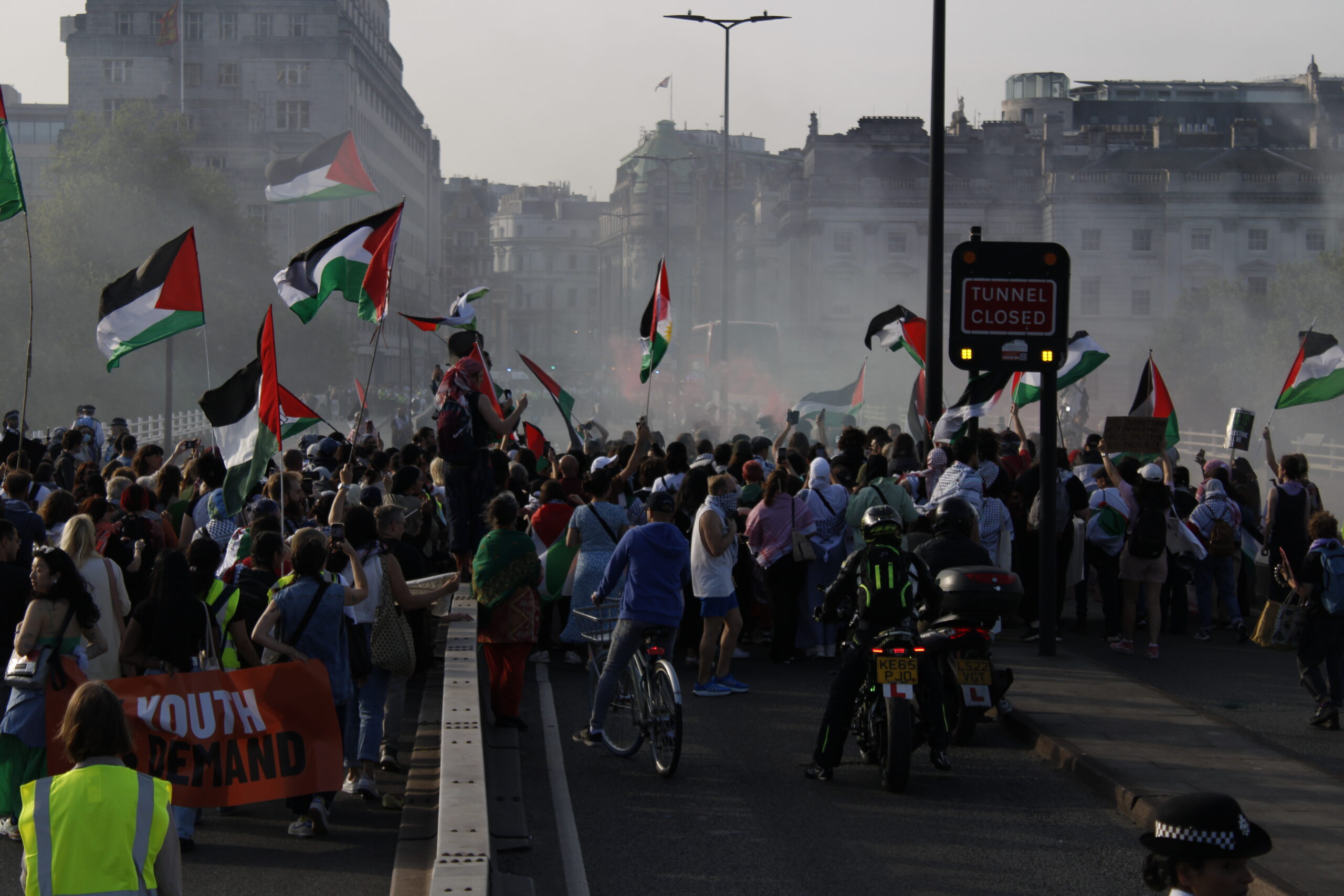A new direct action group for young people plans a summer of mass disruption
Phoebe Plummer does not look like someone found guilty in a landmark anti-protest trial, as they scutter around, dishing out snacks, hugs, and cups of tea at the weekly Just Stop Oil vegan soup night.
“As a 22-year-old, I didn’t really think I’d be preparing for my third time in prison,” they say. “But I know that fundamentally, the way in which I’ve acted is the morally right thing to be doing.”
The anti-capitalist was convicted in May alongside two other Just Stop Oil campaigners for delaying traffic during a slow march for the climate in November. The trio, due to be sentenced in July, could spend up to a year in prison.
“I don’t want to be away from the people I love,” Plummer says. Their partner, a fellow activist, likewise faces the prospect of a prison term. “It’s a very weird relationship anxiety to have, [worrying that] we’re constantly going to miss each other,” they say.
Like Plummer, thousands of young people across the world are turning away from electoral politics to direct action protesting movements like Just Stop Oil. According to the group’s own records, 2,039 people have taken action with the group, and 138 have spent time in jail. Just Stop Oil’s central demand is that the British government end all oil licensing and investment.
According to David Bailey, associate professor in politics at the University of Birmingham, this upsurge in extra-parliamentary politics in Britain can be traced back to the 2010 student protests against a rise in university fees. In the context of “economic insecurity, ecological crisis, war, and a growing sense of hopelessness,” Bailey says it is “unsurprising that there is a heightened level of social dissent and protest.”
Just Stop Oil is now part of the “Umbrella” coalition of different protest groups whose stated aim is to “bring about a revolution.” One fellow coalition member is Youth Demand, a group that made headlines in April when its activists daubed the Ministry of Defence in red paint.
Their campaign has two demands of the UK government: ending all new oil and gas drilling, and an arms embargo on Israel.
At a recent talk for newcomers in Kings Cross, Youth Demand organisers spoke to an audience of around forty about the need for civil disobedience, ahead of a planned campaign of direct action in the summer.
As is made clear by the speakers, a willingness to get arrested is a key trait for anyone hoping to take action with the group. Youth Demand was inspired by the Children’s March in Alabama in 1963, when hundreds of Black schoolchildren were arrested whilst demonstrating for civil rights.
In late May, the group holds a session at a hall in Waterloo, where the participants are introduced to the philosophy of nonviolence. These sessions are compulsory for those who sign up for arrestable actions. They are taken through a simulation of disruptive action on a busy road and taught how to de-escalate tense encounters.
One of the instructors makes clear that emergency vehicles must be allowed through blockades, and cites a Freedom of Information request disproving the accusation that Just Stop Oil has obstructed ambulances – a charge levelled at the group by critics.
Youth Demand’s politics – like Just Stop Oil’s – are decidedly international. Speakers at both groups’ weekly meetings paint a picture of a world divided into a privileged north and an exploited south, where billions face a “structural genocide” caused by the north’s fossil-fuelled mode of living.
When the wave of student rebellions in support of Gaza arrived from the United States in early May, students at University College London were among the first to occupy their campuses. Two days after the first tents were erected, Youth Demand cofounder Sam Holland spoke to the crowd gathered at the gates, pledging to shut down the capital city in solidarity with Palestine.
Horrified at the scale of the climate crisis, the 22-year-old Bristolian quit university in November 2022 to dedicate his time to activism. He has subsequently been arrested multiple times with Just Stop Oil. “There are more important things than career or income,” he says.
Holland acknowledges that governments “don’t care about symbolic action” like throwing soup at paintings – a tactic used by climate groups to gain public attention.
“The endgame is causing mass material disruption,” he says. This involves “blocking the roads, blocking infrastructure, train stations, airports…strikes and general strikes.”
Holland accepts that fear deters some young people from direct action. But he insists that “if you want to change regimes, if you want to change policy, you have to get arrested. You have to break the law. You have to cause disruption.”
Feature image: Youth Demand lead protestors to block Waterloo Bridge, 11 May 2024.

